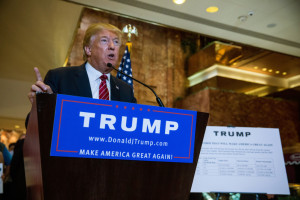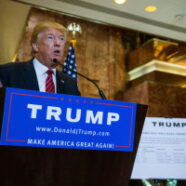Taxes Vs. Wealth
Earlier today, Donald Trump released his tax plan. I haven’t a chance to really check it out. But while I was watching the press conference streamed on CBS, something struck me during the Q&A period and this is the problem with the national press corps: One of them asked about income inequality and how the problem isn’t fixed with Trump’s proposal to lower rates and eliminate deductions.
While I haven’t analyzed the specifics, so I’ll write in generalities, here are two quick points:
First, any plan that levels or changes rates for earned and unearned income and removes all kinds of ridiculous deductions hits the rich worse than it hits the poor or working classes. About half the people in the country don’t pay a dime in federal income tax now. While most are poor, retired, work for the military, some – or many – are rich. Ending their loopholes and deductions brings in more government revenue. Many rich people, it appears, will pay more under Trump’s plan than they do now, while no one on the lower earnings will see many, if any, changes.
Second, income inequality isn’t solved in any way, shape, or form through lower or higher federal income taxes. Income inequality – as well as wealth inequality – cannot be fixed by the tax code or the federal government. As studies have shown, there is currently a transfer of some benefit – it’s truly minor in the scheme of things – from rich people that are paying the bulk of the federal income taxes to poor people who take advantage of services. There are tens of millions of people that fall into the category of people utilizing the services … and so be it, we’re supposed to assist people in need. But those benefits all pale when compared to a decent wage job.
No amount of restructuring of income taxes, corporate tax rates, corporate profits, government spending, or anything else, equalizes income or wealth for 319 million people by taking away from the 5 million households in the nation with assets of more than $1 million. You don’t have to be a Rhodes Scholar to understand this. And it’s not the federal government’s job to do that anyway. The federal government has a limited role constitutionally. Any reporter stupid enough to not realize this should be taken off the campaign trail immediately and given some books to read about the reality of how wealth is created.

NEW YORK, NY – SEPTEMBER 28: Republican presidential hopeful Donald Trump gives a speech outlining his vision for tax reform at his skyscraper on Fifth Avenue on September 28, 2015 in New York City. Under the plan there would be four tax categories, with people earning less than $25,000 per year paying 0% tax. (Photo by Andrew Burton/Getty Images)
I keep hearing these points about “wealth distribution” as if there is someone with a magic wand dictating where it goes. It doesn’t work that way. Wealth is earned and saved, inherited, won in a lottery, and yes, stolen sometimes. Those are the only ways wealth is “distributed” and none of those processes are a function that can be bequeathed or improved by the government.
Income and wealth inequality along with employment do go hand-in-hand; but the government can’t create it or fix it for people. We’ve already proven that more government, more taxes spent, doesn’t do anything to improve people’s wealth or job creation. We’ve tried that, endlessly, trillions, and it doesn’t work. This isn’t liberal or conservative … this is math.
The fundamentals start with a good, decent wage private sector job. After that, we go from there. The country needs to tackle the trade issue and lack of low skill, decent wage jobs first, period. The United States has lost millions of manufacturing jobs and tens of millions of other jobs connected to those jobs since NAFTA 20 years ago. No amount of government spending, no amount of taxes, no amount of grabbing all of the profits from companies and just sending them to people is going to change this fact. It’s $500 billion worth of wealth that leaves every year! A job is the first thing we get done.
The next thing is that a tax structure is created and then left alone. Stop tinkering with it, stop raising it up or down, stop transferring it left or right, stop the political wars on both sides about fairness and the government raping business … set it and forget it … just leave it alone. If your company and your business makes money, you pay X; if you’re an individual or family, you make money, you pay Y. Move out-of-the-way and let the private sector do what has to do to create profits that create jobs and create wealth. A climate needs to be created where people can find work, they can save and spend their money, and they can buy stock in that company if they want to share in the profits. That’s how you share profits (and losses, too). It’s simple. The federal government can’t create wealth and it shouldn’t have any role in creating economic winners or losers. It needs to protect the borders, regulate trade, make sure the population is getting properly educated, etc.
But how do we get wages to rise so people can have good jobs and create wealth? Wages will naturally rise when there is competition for workers not workers competing for jobs. Right now, tens of millions of people are out of work and companies and the government are making it worse by allowing more people to come into the country to take the jobs that Americans could be trained for and, frankly, should do, even the crappy jobs. Isn’t it interesting that the folks who are always out marching demanding that McDonald’s provide a $15 an hour wage are nowhere to be found when the Jamaicans are brought in to pick apples or the eastern Europeans are brought in to clean rooms in vacation communities in Maine or Cape Cod? But, but … it doesn’t matter if the company makes $1 or $1 billion. An employee is an employee. If “fairness” and “equality” dictate a $15 an hour wage – minimum – and a healthcare plan then it doesn’t matter if it’s a teen at McDonald’s or a Lithuanian cleaning a hotel room.
The only way to create competition for workers is to have more jobs created. If we start to bring them home via reciprocal tariffs, ending the bad trade deals, or by targeting tariffs on large companies – a constitutionally acceptable way of raising revenue and protecting our workers, something Trump, Mike Huckabee, Rick Santorum, and Bernie Sanders have all touched upon – we’ll see more hiring. When there’s more hiring, workers shift between jobs to get better jobs, making the previous jobs that are vacant harder to fill unless wages (and to a lesser extent, benefits) encourage employees to step up. Right now, it’s the opposite: Workers are constantly competing for access to limited openings and are often negotiating down, not up (unless they have affluent spouses with comfortable, secure jobs, and can wait for the right opportunity to open up and the wage your want, or are a municipal government employee).
This is a better way of jumpstarting the jobs issue – which then fixes the wealth issue – than raising more taxes, hiring more government workers to collect said taxes, then releasing the money for makework projects that either end and need to be replaced again with more makework or never end like The Big Dig, which then requires more taxes and more spending, etc. That’s the only way the government creates jobs.
There are other subset issues around this issue like making sure that government money is spent wisely now and does the things it’s supposed to do. Waste, fraud, abuse, corporate welfare, and misappropriation in sectors like the military all have to be tackled, too. But if reporters – and the nation – are going to talk about income and wealth inequality, understand the basic principles first, please.
Photo credit: CBS New York






